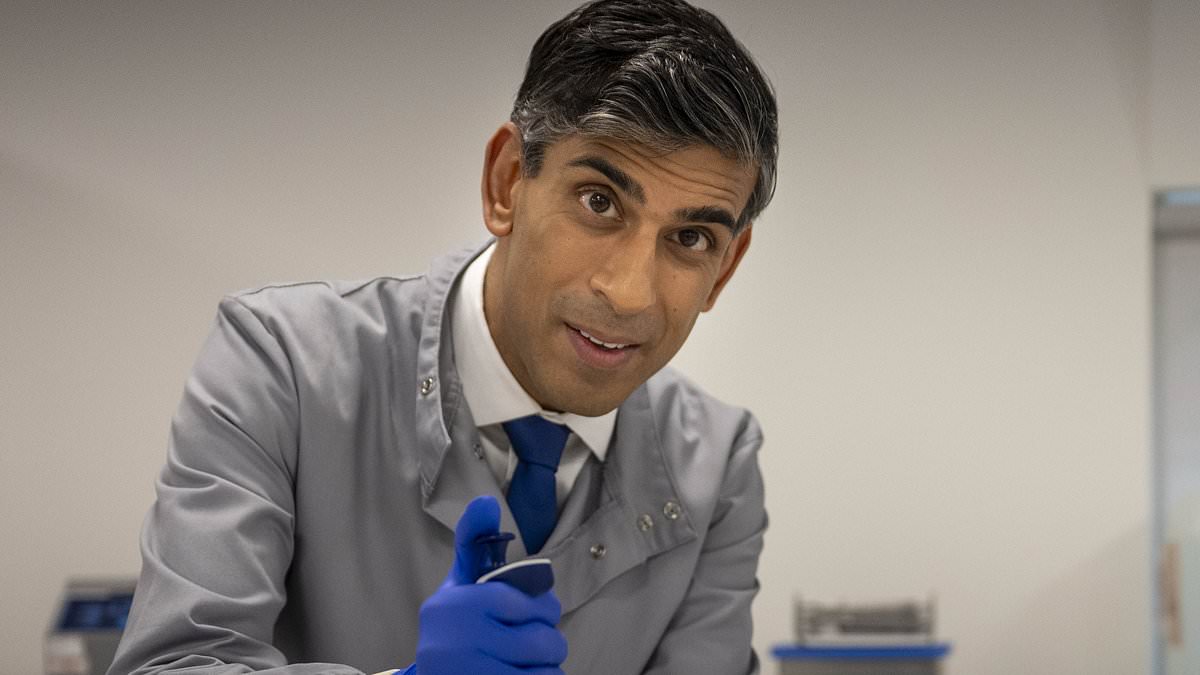Rishi Sunak today joins the Daily Mail’s campaign for nationwide prostate cancer screening after seeing ‘too many friends’ battle the disease.
The former PM added his support to the growing clamour for targeted testing on the NHS for those at the greatest risk of suffering with the disease, the most common form of cancer among men, with 55,000 new cases a year.
And Mr Sunak, 44, praised the Mail’s long-running call for action, saying this newspaper’s coverage of the issue ‘piqued my interest’ on a disease which most frequently affects black men, and those with a family history of it.
He said a new British-made test – with a more than 90 per cent accuracy rate – gave fresh hope that thousands of lives could be saved every year if it was made available as part of a targeted nationwide roll-out.
Announcing his decision to become an ambassador for Prostate Cancer Research (PCR), his first public cause since leaving No 10 last July, Mr Sunak said: ‘There is great research being done by PCR and other charities about why the country would benefit [from a screening programme], not just that the NHS would save an enormous amount of money, but most importantly we can save thousands of lives.’
Mr Sunak added: ‘I absolutely commend the Mail who have been a long-standing supporter of this cause, and rightly so.’
Some men suffer from problems urinating, but prostate cancer is often symptomless, meaning early detection is crucial in stopping the disease’s spread.
Yet the most recent attempt to trigger a nationwide screening drive in 2020 was dismissed after experts raised concerns over the efficacy of tests available then.
Mr Sunak last week toured the headquarters of Oxford BioDynamics, the firm behind next-generation blood test EpiSwitch PSE. The test is 94 per cent accurate in identifying men with prostate cancer – compared to the standard test, thought only to be correct in around half of cases.
A new, targeted testing programme would invite black men and any over-45 man with a familial history of the disease to give a blood sample for analysis.
Oxford BioDynamics executive chairman Iain Ross said: ‘The support of Mr Sunak and PCR is a powerful testament to the importance of early, accurate prostate cancer detection through next-generation tests like the EpiSwitch PSE.’
In government, Mr Sunak announced with PCR a £42million screening trial to find ways of detecting prostate cancer earlier.
But it is hoped a national screening programme would be the most effective way to prevent unnecessary deaths.
The UK national screening committee (NSC) has come under increasing pressure to reconsider testing policy following the news last year of Sir Chris Hoy’s diagnosis with the terminal illness.
The 48-year-old six-time Olympic gold medallist said he has been given between two and four years to live. And he revealed going public with his own diagnosis led to a friend’s prostate cancer being caught early.
Mr Sunak said he was so impacted by the number of friends affected by the disease he got a test himself. He said: ‘You go and get a simple blood test. Knowledge is power and that’s why I wanted that reassurance.’
During the visit to Oxford BioDynamics, Mr Sunak met with men affected by prostate cancer.
Alfred Samuels, 66, who was given just months to live when he was diagnosed in 2011, said a technology-backed roll-out would be ‘priceless’. The former A-list close protection officer from north-west London added: ‘It will give men much more hope, much more direction.’
Few people know about the need to detect prostate cancer early better than Brian Milne.
The 72-year-old retired financier from Hertfordshire saw his father John die with the disease 21 years ago after experiencing classic symptoms such as trouble going to the loo, and blood in the urine.
Himself fit and healthy, Brian said he ‘was comforted to be told’ by his father’s oncologist: ‘Don’t worry if you haven’t got any symptoms.’
But eight years ago, the married father of three daughters and grandfather of five was dealt the crushing news that, just like John, he had prostate cancer.
He had visited a walk-in clinic with what he thought was a urine infection, but was quickly discovered to be stage-four prostate cancer. He later learned it had already spread to his bones.
‘If I had been tested when my father died, I would be just like any other guy,’ Brian told the Mail.
‘I would be expecting to die of old age.
‘I might have had a heart attack down the line, I might have had anything else, but I would not have died of prostate cancer. But now I am.
‘If it was recommended, I would have taken the test.’
Brian said he was ‘certain’ his prostate cancer would have been caught before it was too late, had the proposed screening programme been in place.
But rather than being bitter about what might have been, he is positive that the development in accurate blood testing represents ‘an incredible step forward’.
‘I am honestly over the moon,’ he said.
‘You go through all the stages. Yeah, I got angry because of what I knew I’d be leaving behind.
‘I remember when the consultant, just before I started my chemo, said: It’s good to have aims if you come out of this on the good side, so what do you want?
‘The first thing I said was to goof around my grandkids.’
Brian now shares his story to help raise awareness of prostate cancer and the importance of early detection.
